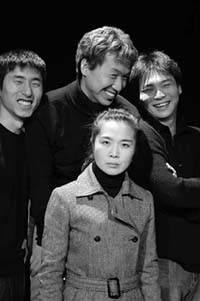
The production is being staged as part of the Hyehwa-dong Drama Lab"s annual festival under the theme "Regretting Authority," and two other adapted works of Shakespeare"s Hamlet and Macbeth will follow under the same theme this spring. The Hyehwa- dong Drama Lab has tackled themes like "Sexuality" and "Six Senses" in the past, and this year"s "The Ninth Institution" opened the third festival with its examination into the meaning of authority.
There is no hero or revolutionary figure to admire in this play. The pure delight is in watching the humor and tension overlap continuously with each scene. The class struggles between the director of the asylum, the administration, and the understaff; the sexual innuendos focused around the only female worker; and the suppressed emotions just about to erupt from underneath the smooth surface are shown in a subtle, almost slapstick comedy style. That, however, is just the start of appreciating "The Ninth Institution."
The opening dialogue between the director of the asylum and his assistant immediately reveals the institutional hierarchy by the differentiation between patients and administrative staff. Patients are referred to by their numbers 6457 or 6459, while the staff members have names; names that explain their self-identity. Roote, although not what most people would call smart, dominates over his subordinates with a barking voice and resorts to his deep-rooted authority when he feels insecure. Gibbs, the manager of overall matters, assumes a professional manner at all times, while Lush makes you laugh with his consistent babbling and sleaziness.
As the play proceeds, however, the audience becomes captured by sinister conspiracies, mysterious deaths, and hidden desires. All these are well covered up, with contradictory settings such as the Christmas tree twinkling in the corner, or the huge teddy bear on the sofa that is cuddled by almost every character that enters the room. The relatively light atmosphere, though, is disturbed by sudden echoes that are heard by the characters, whether real or imagined, and also by the interrogation of Lamb, an innocent understaff worker - a scene which mesmerizes the on-lookers with a horror and helplessness that matches that of watching a rat being tortured in a scientific experiment.
"The Hothouse" was Harold Pinter"s second script, written in 1958, though it did not go on stage until 1980. His plays are known for their "Pinteresque" themes that relate to mental disturbances, sexual fantasies, jealousy, and obsession. Although at first sight, the play seems unbelievably comical and humoresque, the audience can realize with time (the play is two and a half hours long), that it does not deviate from the Pinteresque norm. Park Yong-suk, the stage producer for "The Ninth Institution" has kept the spirit of the original work and set it in a Korean environment. The actors bring the show alive, especially Roote, whose energetic force and gusto keep the audience hung upon his every word.
Christmas carols, traditional Korean songs, and Eminem hip-hop intermingle as scenes build up the tension. The emotions of the characters come to a climax as Christmas midnight approaches and explodes into an ending that proves to be tragic yet not wholly surprising. What is significant in the end is not the happenings themselves, but the casual manner in which one of the characters carries on the duties of the institution. Authority is challenged, but is not dissolved as the curtain falls down.
ejc1282@ewha.ac.kr

